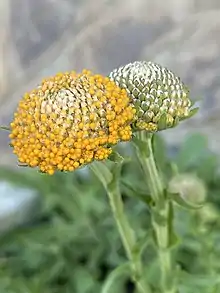| Craspedia aurantia | |
|---|---|
 | |
| Scientific classification | |
| Kingdom: | Plantae |
| Clade: | Tracheophytes |
| Clade: | Angiosperms |
| Clade: | Eudicots |
| Clade: | Asterids |
| Order: | Asterales |
| Family: | Asteraceae |
| Genus: | Craspedia |
| Species: | C. aurantia |
| Binomial name | |
| Craspedia aurantia J.Everett & Joy Thomps.[1] | |
Craspedia aurantia, is a flowering plant in the family Asteraceae and grows in New South Wales and Victoria. It has light green leaves and heads of yellow to reddish-brown flowers on a single flowering stem.
Description
Craspedia aurantia is a herbaceous plant with a single flowering stem 15–60 cm (5.9–23.6 in) long and roots densely covered in thick, matted hairs. The leaves are mostly attached at the base, spoon-shaped, 2–16 mm (0.079–0.630 in) long, 2–25 mm (0.079–0.984 in) wide, pointed to broadly tapering to a point, narrowing gradually at the base, and glabrous or sparsely hairy. The yellow to orange-brown flowers are borne in heads 15–30 mm (0.59–1.18 in) in diameter with about 40-90 florets in each head. Flowering occurs in summer and the fruit is a cypsela 0.5–1.5 mm (0.020–0.059 in) long and 0.1–0.8 mm (0.0039–0.0315 in) wide.[2][3]
Taxonomy and naming
Craspedia aurantia was first formally described in 1992 by Joy Everett and Joy Thompson and the description was published in Telopea.[4][5] The specific epithet (aurantia) means "orange" in reference to the colour of the flowerheads.[5]
Distribution and habitat
This species grows in alpine and subalpine grassland and heath in New South Wales and Victoria.[3]
References
- ↑ "Craspedia aurantia". Australian Plant Census. Retrieved 6 December 2021.
- ↑ "Craspedia aurantia". VICFLORA-Flora of Victoria. Royal Botanic Garden Victoria. Retrieved 7 December 2021.
- 1 2 Everett, J.; Doust, A. "Craspedia aurantia". PlantNET-NSW FLORA ONLINE. Royal Botanic Garden Sydney. Retrieved 13 December 2021.
- ↑ "Craspedia aurantia". Australian Plant Name Index. Retrieved 13 December 2021.
- 1 2 Everett, Joy; Thompson, Joy (1992). "Craspedia aurantia". Telopea. 5 (1): 49. Retrieved 13 December 2021.